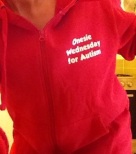
Over £700 raised for the National Autistic Society
At work on Weds 2 April 2014, we raised over £700 for the National Autistic Society. Nutty staff sweated in onesies. (Some of us taught a course, sweating in a onesie.) Other generous ones gave and sold cakes, made music, shook buckets, and donated wads of cash. Staff at all grades put notes in the buckets. Some people gave hugs, sent poignant emails, and gave words of encouragement. Not bad – for a bunch of reticent bean counters.
Why the National Autistic Society?
My seven-year-old son (L) has Asperger’s syndrome (sometimes called high-functioning autism, or ‘mild’ autism). So does his dad. Doctors say I’m a few points shy of the spectrum – but girls hide it better, and are underdiagnosed. Aspergers is an invisible disability, affecting interaction and communication. (Ironic, perhaps, for a family of writers, communicators and thinkers.)
Medics bunch all autistic conditions together, but the spectrum is wide. It spans the mildly quirky, the obviously impaired, and those who are non-verbal, non-functioning and need lifelong care. They say that if you’ve met one person on the spectrum, you’ve met one – each is unique. Yet people with Aspergers share the same ‘triad’ of social difficulties – communication, interaction and social imagination (sometimes described as showing poor empathy). God wired aspie, or autistic, brains differently – there is no magic ‘cure’. They (girls, particularly) can mask it and learn skills to cope and fit in. But they can’t change their brain wiring. They will probably always feel wrong and bad. That’s the science bit.
Close to home
L is an ‘Aspie’. He has ‘tics’ – repetitive behaviour that he can’t control, which increase in times of stress or excitement (and it’s sometimes hard to tell which he’s feeling). In his first school year, he had a tic where he licked each finger in a particular order – repeatedly, all day. Another tic had him: flick his hands out (Tommy Cooper style), grimace, flap his arms like a chicken and then jump (all in the space of a few seconds). Again, repeated dozens of times daily.
L – like most Aspies – is sometimes bullied or ostracised. Like a vulnerable alien, Aspies assume that everyone is kind, unless shown otherwise. Hurting people deliberately is illogical. Aspies are honest and never intentionally hurtful. They can misinterpret normal teasing as bullying, and see bullying attention as overtures of friendship. People are hard to understand.
In reception year, the teaching assistant found it funny to repeat L’s name (when he didn’t first hear her) until he would clamp his hands over his ears and cry. Hearing this from her, seeing her laugh, my shock stopped me from reacting. I walked away, winded at my treachery for not defending him. Or punching her. (Wrath of the Tiger Mom.) A few days later, I calmly made a complaint to his teacher. The teaching assistant continued to tease him, for the rest of the year. L learned that not everyone is trustworthy, and that his parents can’t protect him.
Upsides and contradictions
L has a terrifyingly high IQ – he counted up to six before he said his first proper words. He liked to line up toy cars in a perfect colour spectrum. He arranges rather than plays. He can remember events from when he was two, but can’t find his bedroom in our modest (but tasteful) flat. He forgets to eat or drink, when absorbed in something he loves. He mastered sarcasm aged two, but has a gentle intuitive nature. He befriends people who are different, like him, and shuns the loud and arrogant. He sees beauty in water swirling down a dirty East London drain. He thinks pop music is “the same song, repeated”, and prefers Johnny Cash and the blues. He is upset by injustice and poverty, and wants to work for a charity. He says work is a “one-day jail”, yet happily does chores for pocket-money. The little swine tells me when I’m a fool, which is often. He corrects my grammar, which happens less often.
L doesn’t like to be touched when he’s hurt or upset – or, in fact, most of the time. He finds it hard to know how to play with other kids. He wants to play, but he tries to control everything and has meltdowns when others don’t conform. He finds it hard to understand ‘reciprocity’ – in play or conversation. These things draw judgmental glances (and sometimes words) from other parents. Yet he’ll cuddle us to bits when he wants – on his terms. He likes to press flowers, dance alone, and cuddle the cat. He hates circuses, pantomimes, theme parks and crowds. He devours poetry, Shakespeare and war films. He eats whole limes, raw ginger and seafood. He hates mashed foods, and foods touching on his plate. He can spot a liar or a manipulator. He tells it like it is – sometimes brutally. He described a family christening service as “boring but beautiful”. He writes a journal of philosophical thoughts, such as “We have to die, or we’d see too much pain.”
World Autism Awareness month
The night before Onesie Wednesday, I watched a documentary to mark World Autism Awareness month, by autism expert Professor Uta Frith. It was hard viewing. Many people with Aspergers will never work. They struggle to keep jobs, relationships and friends. We misunderstand and misinterpret them. We tell them to change, to fit in, while no ‘neurotypical’ tries to understand or adapt to them.
The documentary showed a boy who, when given any date in history, could tell you its day of the week. Professor Frith said he was a ‘calendric calculator’. He was an amazing boy – not a specimen under a microscope. They say Aspie’s lack empathy, but many scientists are reputed to be autistic, which explains a lot.
Diagnosis and outlook
Diagnosis can be agonising, and take many years. Many people give up. Many people live their lives not knowing they’re on the spectrum. They live with untreatable depression, constant anxiety, poor self-knowledge, broken relationships, short-term employment, alcoholism and other addictions.
Sorry for the cheery picture, but them’s the facts.
Services for your money
The money will help the National Autistic Society to fund research and specialist schools, improve access to diagnosis, and give people better support and opportunities.
L is lucky. He has the middle-class, polenta-eating parents who have books and pester-power in the education system. We will fight for him – while not quite punching teaching assistants. Others who aren’t so lucky will benefit from your donations.
NPFN
Aspergers’ characteristics
Aspies struggle to:
- read emotions, facial expressions and social situations, and know how to react appropriately (the lacking empathy myth)
- say the ‘right thing’ (offending people unintentionally)
- have reciprocal conversations (and reciprocal play, as children)
- make and keep friends and partners (being alone is easier than constant criticism and error)
- manage anxiety and stress, which they feel constantly
- understand nuance and idioms (they ‘dance to a different tune’ but may not understand such sayings)
- tolerate noise, crowds, and change (become reclusive, to cope).
Aspies love:
- routine and repetition (same route to school, DVD, and food – every day for months)
- logic, intellect, science, or literature
- some special interest or obsession (discussed constantly, in great detail, and oblivious to your boredom)
- peace and quiet.
Aspie upsides:
- Not all Aspies have ‘Rainman’ abilities, but some excel in their special interest because of their ‘hyperfocus’ (dare we say, obsessions).
- Many brilliant scientists, writers, inventors and innovators are on the spectrum.
- They often have a wicked, and quirky, sense of humour – a survival technique.
- They see the world differently, and often beautifully.
- They bring light to a sometimes-dull existence.
Why must I be misunderstood?
One Aspie girl was misdiagnosed, and treated, as schizophrenic for years. Her doctor asked if she heard voices. She replied yes – because we hear voices, don’t we, when people are actually talking. That wasn’t what the doctor meant. Aspies interpret words literally, see the world as black and white, and assume that people can read their minds. Simple misunderstandings can have lifelong consequences.
Onesie Wednesday overall
Money from Onesie Wednesday will help people like Julie (and her son Richard) who contacted the NAS’s educational rights service. The service has supported 16,000 families in the last 10 years.
Julie’s son was diagnosed with autism before he started school. She contacted the National Autistic Society’s education rights service for help, after Richard’s school refused to assess his needs. Your £15 will help a family get the educational support their child needs.
With the help of the NAS, Julie went to tribunal three times over the next six years. Eventually, Richard got his assessment and went to a specialist school for children with Asperger syndrome.
“We were given help by an NAS education advisor. The lady was just wonderful. She was advising us all the time. She was always at the end of a telephone. She listened to us endlessly and she supported us all the way. She held our family together to be honest, says Julie.
I can’t tell you how wonderful things are now. He’s settled into school, he’s really into his LEGO and he’s making excellent progress … If we had to say ‘thank you’ now for the rest of our lives, we would never be able to thank the NAS enough!”
National Autistic Society: www.autism.org.uk




